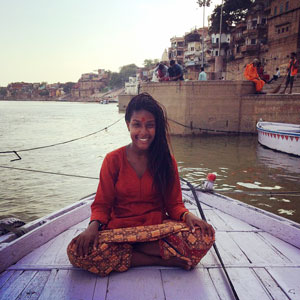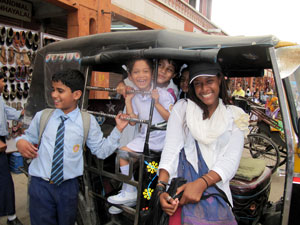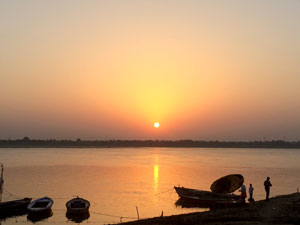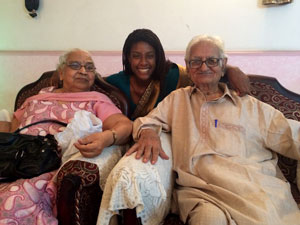
Give us a little intro!
Kalen: I am a Communication and Political Science major from Albany, California. At the moment I would have to say my favorite dance move is the infamous pelvic thrust by the Bollywood star Hrithik Roshan in Dhoom 2. Having watched my share of Bollywood films and music videos in India this one will always be my all time favorite.
Why did you pick this program?
Kalen: When deciding on where and with which program to study abroad with the options were endless. There were places like France, Belgium, Morocco and South Africa with various programs offering a variety of options. Not to say that these are not all amazing places to visit, but I wanted to push myself.
I wanted to go to a place that on my own I couldn’t imagine doing and that wasn’t similar to my home country. When I saw Delhi, India something just clicked. It was in the capital of India and the course options offered by IES though minimal offered a variety of options. IES was the only program offering a semester in the capital and that made them even more appealing.
The field trips that were included also sounded amazing. Yes it also seemed a bit scary, and at times I had cold feet during the process, but IES offered so much pre- departure information and supporting tools that I wasn’t so scared by the time I got on the plane. I picked this program because it was not a program for just students who were interested in journalism or finance but a wide range. I was able to meet people from across the country with various perspectives, which only enhanced my experience!
What do you wish someone had told you before you went abroad?
Kalen: This question I have always loved reading the answer to and now that I have studied abroad I am a bit surprised by the simplicity of my answer. Yes there are many things that you should be reminded about before going abroad but for me I think its important to remind people of this well known phrase, “you only get out of it what you put into it.”
In so many ways your study abroad experience is what you make of it. If you are shy and hesitant you may not meet as many people you had planned or immersed yourself within the culture like you wanted. Put yourself out there and what you receive back you will find rewarding. Studying abroad is a once in a lifetime experience, and for many the one and only time they will experience such a unique and potentially eye opening few months.
From studying abroad I have not only learned to be open minded but have opened my mind to the thought that regardless, if ones new experiences are filled with complete happiness or distress you will learn something never the less, you will grow never the less, and will contribute to this lovely cycle of human exchange never the less.
What is the most important thing you learned abroad?
Kalen: The most important thing I learned abroad is to sometimes go with the flow. If there is one thing I learned in India it is that. Yes structure in many ways is something that is necessary in order to keep and maintain stability in life however there is a point when it begins to hinder life’s experiences.
You don’t always have to fallow how you have planned your day to a T, and while in India I found that many times it was day when my plans had completely gone awry that I had the most humbling, moving, and eye opening experiences. Go with the flow! Yes I know that sounds a bit strange of me to say, but I encourage you all to make an effort to do so.

What do you tell your friends who are thinking about going abroad?
Kalen: When friends tell me that they are thinking about going abroad I encourage them to go for it! Studying abroad I find is such a critical part of ones college experience. This is the best time in your life to travel and learn about other cultures before you begin working your 9-5 job and the idea of spending more than a weeks in another country begins to sound far fetched.
Studying abroad has been a highlight of my college years and I tell my friends that if one is able to do so do it. Not only can it be life changing but help you learn things about yourself that you didn’t know and help you in finding a suitable career path as well.
What was the hardest part about going abroad?
Kalen: The hardest part about going abroad is not being able to find refuge in the comforts of my own home. When having a hard day I didn’t have my mom to hug or an easily accessible gym for me to relive stress. The things that were familiar to me were for the most part gone, and adjusting to the difference took time. I had to figure out a lot of things on my own.
You will soon find out that even though family and friends can be ones strongest support system they will not always understand. They will not always say the things that you want to hear, or get what you’re trying to make them understand. This is normal! It may be difficult to realize that in many ways you are on you own and have to learn how to adapt and figure out the answers to questions by yourself.
What's your favorite story to tell about your time abroad?
Kalen: One of my favorite stories to tell about my time abroad is when I went to the market to find a few cheaply priced pair of pants to add to my growing Indian wardrobe. As we walked down the Delhi streets I found some beautiful pants that I wanted to buy in bulk.
While me and my roommate began to engage with the shopkeeper he started off with an absurd amount of 900 rupees for one pair of pants. Knowing that he was attempting make a huge sale off of a foreigner I used a little Hindi, telling him that the price was too high. Suggesting a more reasonable price for 200 rupees he to my surprise quickly agreed to it.
Still feeling cheated knowing that his quick compliance meant I was still paying too much I tried to go lower. As we began to argue about my suggested prices of 150 he began to get agitated to me, and at one point asked me what is 150 rupees to you? Shocked a bit I began to think what was 150 rupees to me? Yes 150 rupees is more or less 1.50 US dollars, but the thought that the vender was selling me pants for 900 rupees and then agrees to 200 rupees when he realizes I have some sense made me upset.
I knew 900 rupees was still cheap but the idea that the price was this high because they knew I was a foreign made me feel a mixture of anger and annoyance. But then I remind myself that 900 rupees for these vendors meant food on the table and clothes on their backs. I felt bad haggling a man for one-dollar pants when I pay 100 US dollars for a pair in America and think I’m getting a deal. It made me put things into perspective and was a very important moment for me during my time abroad.

What made this experience unique and special?
Kalen: I think what made this experience unique was the balance between independence and structure. Yes for the most part we could do anything we found ourselves in the mood for, but when needed IES offered us some stability. They offered us a variety of things for us to participate in and helped make us feel a little bit more at home when the Delhi streets were giving us a hard time.
One thing that I absolutely loved about IES was student activities day. We learned how to Bollywood dance every week for about an hour, and it was such a break from the stresses that were always awaiting us outside of the IES walls. I loved learning moves I had never tried before, and laughing and or sweating with my classmates when we messed up or were finally getting a step right.
Our center once every couple of weeks also had a cooking class where we learned how to make simple dishes that hope to replicate now that I am here in the states. We learned how to make some of my personal favorites, like palak paneer, aloo gobi, and kheer. I soon realized that all you really need is masala and an endless supply of veggies and your good to go!
Student activities every week and our trips to places like Varanasi and Chennai made my experience so very special. I built a new family through the interactions we had at IES and in a way made my experience in India less overwhelming and more rewarding.
Tell us about an experience you had that you could not have had at home.
Kalen: This may sound a bit strange but I think the constant chaos would be my answer. Chaos for the most part is a frightening phrase for but to me was not frightening in the slightest. On any given day in India cars would be in and out of lanes accompanied by accidents which would include an aggressive push by the victim and a vehement response by the other on the side of the road.
An elephant on the street was not uncommon and begging children or handicapped elders asking for money at every stop and turn was normal. I was always stimulated while in India. With so much going on, and with so many people there was never a dull moment. In the states even the most basic rules are enforced.
If you're driving fast you should be aware of the real chance that you might get a ticket. In India that’s not the case. There were things that I would see on a daily basis and would wonder if it was allowed. Most of the time it wasn’t but with a billion people not every rule can be enforced. Not to say that there was no order in India, but the variety and diversity of my experiences I don’t believe I would have found anywhere else.
What is one piece of advice you'd give to someone going on your program?
Kalen: I am sure many students who have studied abroad would agree with me when I say perseverance is essential. Regardless of where you decide to go abroad there will be times when things get difficult. You may miss your family and friends back home, having a tough time with the language, or just feeling like you don’t fit in.
That’s normal and I urge you to not shut down. Don’t give up on your whole experience abroad just because things get tough. Yes it is difficult to start new in a completely different country and culture but along with difficulty come rewarding, eye opening, and one of a kind experiences.
Too many times I saw friends and students from other abroad programs forget why they decided to go abroad. We go abroad for a challenge, to learn something new, to be tested, and answer questions you didn’t think you needed the answer to. There is no doubt that studying abroad is a challenging experience, however I believe through perseverance the outcome will be well worth the peed bumps you must pass on the way.

What made this trip meaningful to you, or how did this trip change your perceptions, future path?
Kalen: I always knew that I loved to do and see new things but traveling to India made be realize that its more than just seeing and doing. Studying abroad in India showed me how much you can learn from engaging with another culture. The understanding not only of the new culture you have inserted yourself into but a better understanding of where you come from.
Many times traveling can be surface level, and although that is nice this journey has shown me that I enjoy engaging with other cultures even when challenging. I also have loved sharing my experiences with family and friends. Seeing them learn just a bit about India from me makes me smile every day. I now am highly considering joining the Peace Corps after graduating!
How could I personally enhance my experience abroad?
Kalen: As I mentioned a little bit when answering the previous question I think the best way to enhance your experience is going beyond surface level observation. Learning about the food and various holidays in a new country is interesting, but I think studying abroad offers you the opportunity to do more than just that.
You are able to learn not only about the cultural layers within a new country and how that influences concepts of time for ex. but then reflect on how this differs or is similar to your home country. It gives you the opportunity to engage in deeper intercultural understanding which once achieved allows you to see and do things you otherwise would not do.
Don’t just be an observer and point out what they do in China or Australia, but dig deeper and be open to deep learning and the questioning of values. Once you go beyond the surface you will learn and grow even more than you imagined.